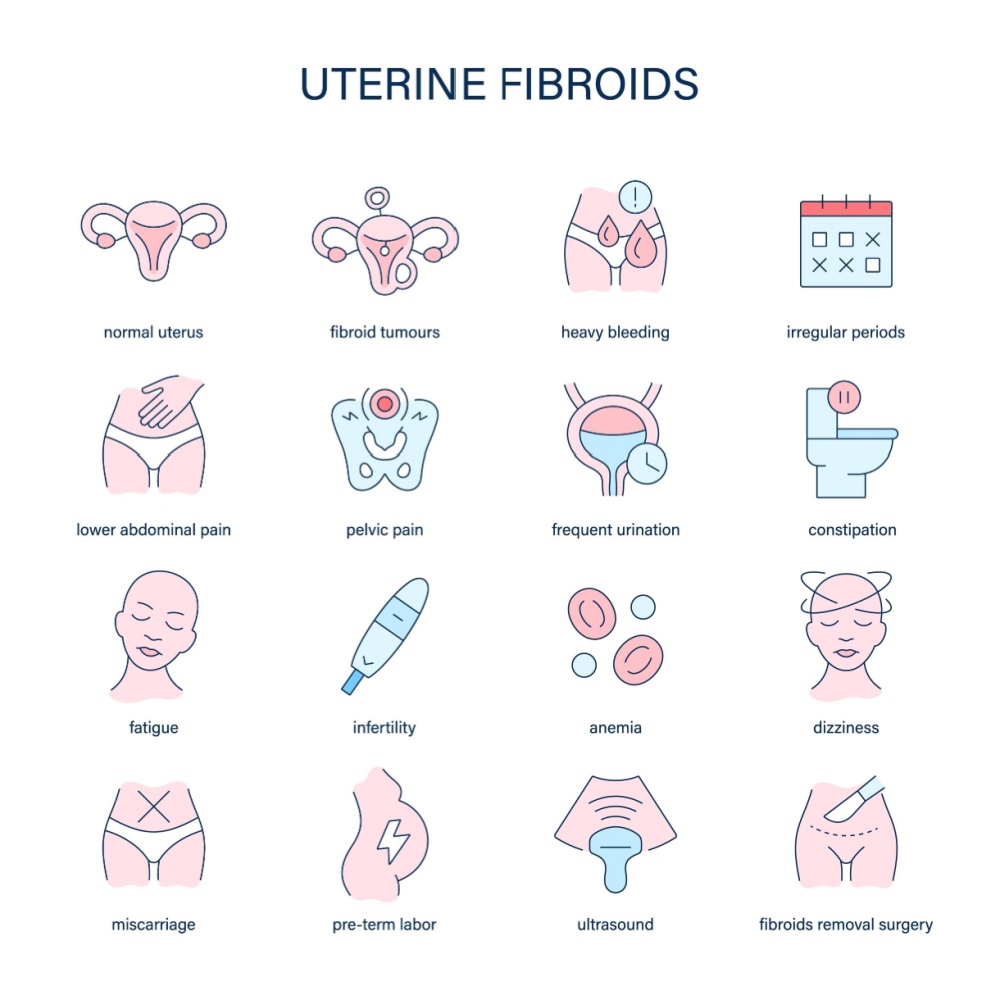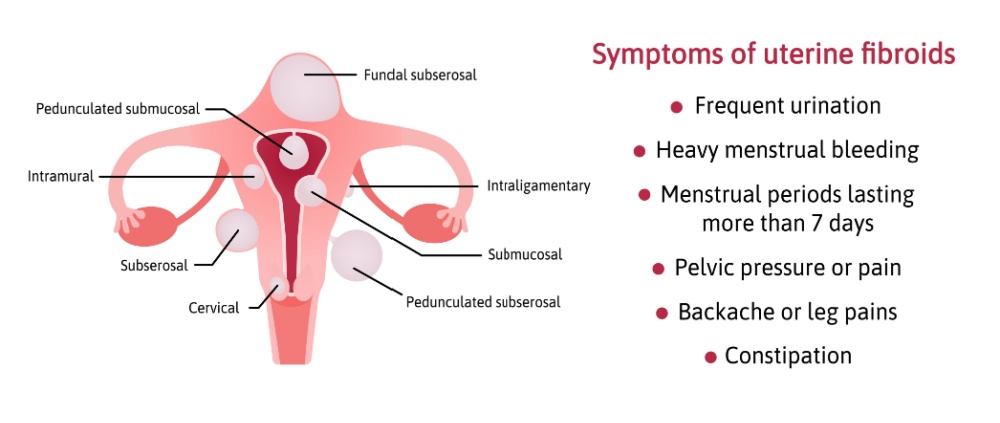What's On This Page?
ToggleThere seems to be a higher occurrence of uterine fibroids among women dealing with thyroid issues. Fibroids, which are benign tumors that grow within the uterine muscle, can lead to a variety of menstrual irregularities, including prolonged and heavy menstrual bleeding, known medically as menorrhagia. Oftentimes, endometriosis coexists with fibroids, but a lesser known condition does too: Thyroid disease!
The hormonal changes that occur with this gynecological condition often coexist in women with imbalances in thyroid hormone. That’s the topic of this article.
While this observation doesn’t establish a cause-and-effect relationship, it highlights a pattern that warrants further investigation. A lot of women don’t realize they have these growths, until they realize that they have all the symptoms! It’s then they go get checkout out and find out they have fibroids. A lot of women with fibroids also may not even realize they have thyroid disease. But there’s a tight connection.
The most common symptoms of uterine fibroids include heavy periods, pelvic pain, difficulty emptying the bladder, constipation, and back pain. Exploring the link between uterine fibroids and thyroid issues, including hypothyroidism and Hashimoto’s, unveils a complex interaction driven largely by hormonal imbalances, immune responses, and perhaps even genetics.
Did you know that having fibroids increases the risk of developing a thyroid nodule or goiter?! Here’s a 2022 STUDY that discusses it. This suggests that iodine deficiency may be at play because that is a known potential cause for goiters.
Let’s dive into the clinical aspects that might tie these conditions together and after that I will outline a plan of action. Creating a plan of action for women who have a thyroid illness and are experiencing symptoms of uterine fibroids involves understanding the potential causes, major symptoms and hormonal levels.
Menstrual Cycles Matter
Heavy menstrual bleeding is indeed a significant symptom often associated with these uterine growths. The symptoms can significantly impact your quality of life and may lead to other issues like anemia due to excessive blood loss. Did you know that anemia is not just a sign of iron deficiency, but also it can be a sign of vitamin C deficiency! Surprised? Most people don’t know that. You may be interested in my article, Can Vitamin C ReplaceStatins? 3 Potential Benefits For Cardiovascular Health.
Heavy periods can be a symptom of thyroid illness, independent of uterine fibroids. The thyroid gland plays a vital role in regulating menstrual cycles through its influence on hormones. Both hypothyroidism (underactive thyroid) and hyperthyroidism (overactive thyroid) can cause menstrual abnormalities, including heavy periods. Take a few minutes to read this article: https://suzycohen.com/articles/thyroid-health/

Consider Various Aspects of Health
Hormonal Involvement: The balance of estrogen plays a critical role in both thyroid function and the growth of uterine fibroids. Excess estrogen, or estrogen dominance, can occur in the context of hypothyroidism due to the slowed metabolism of hormones.
This imbalance can provide a fertile ground for fibroids to develop or increase in size. Furthermore, high levels of progesterone can be another cause for these growths, so evaluating that hormone is critical too – it’s not just about estrogen! The at-home DUTCH Complete Test can help you and it is now sold without a doctor’s order. You can buy it yourself now. See below for more details.
Immune System Involvement: Hashimoto’s thyroiditis showcases how an autoimmune mechanism targets the thyroid gland, potentially leading to hypothyroidism. This same dysregulation of the immune system might influence the growth of fibroids too.
Thyroid Hormone Effects: Thyroid hormones are pivotal for regulating overall metabolism, which extends to how the body processes sex hormones. With hypothyroidism, these metabolic activities slow down, possibly leading to hormonal imbalances that favor the development of fibroids. Measure your sex hormones with the DUTCH Test, a convenient at-home urine test.
Weight and Insulin: Obesity is linked to chronic inflammation and, in many cases, insulin resistance. These shared factors point to a systemic environment that favors fibroid growth formation.
Genetic Connection: There’s ongoing research into whether genetic predispositions may make someone more likely to experience both thyroid disorders and uterine fibroids. The evidence here is emerging but suggests a potential overlap in the genetic factors influencing both conditions.
Let’s go over the 14 natural remedies that may interest you. In alphabetical order:
1. Ashwagandha
An adaptogen that can help in balancing stress hormones, Ashwagandha may indirectly support thyroid function and potentially aid in the management of fibroids by reducing stress-induced hormonal imbalances.
2. Calcium-D-Glucarate
This supplement aids in detoxification and the removal of excess hormones, particularly estrogen, from the body, which can be beneficial in managing conditions like fibroids that are estrogen-dependent.
3. Chasteberry (Vitex agnus-castus)
Chasteberry, a herb traditionally used for menstrual irregularities, offers a dual mechanism of action relevant to both thyroid health and fibroid management. It exerts a dopaminergic effect that can indirectly influence thyroid function, while its modulation of the pituitary gland impacts estrogen and progesterone levels, hormones implicated in fibroid growth.
Preliminary studies indicate its utility in reducing fibroid size and mitigating menstrual symptoms, although further research is warranted.
4. Curcumin
A polyphenolic compound derived from turmeric, Curcumin, exhibits potent anti-inflammatory and antioxidant properties. Its relevance to uterine fibroids lies in its ability to inhibit fibroid cell proliferation and induce apoptosis, potentially through modulation of the estrogen receptor pathway and downregulation of growth factors. Clinical trials suggest that Curcumin’s systemic anti-inflammatory effects can also attenuate the fibroid-associated symptomatology, particularly when combined with conventional treatments.
5. DIM (Diindolylmethane)
DIM supports the metabolism of estrogen in the body, promoting a healthier balance of natural estrogens which might be beneficial for those with fibroids and hormonal imbalances related to thyroid issues.

6. Green Tea Extract (EGCG)
Epigallocatechin gallate (EGCG), a compound in green tea, has been shown to have anti-inflammatory and antioxidant properties. It may help in reducing the size of fibroids and supporting overall metabolic health, which is beneficial for thyroid function.
7. Inositol
Particularly myo-inositol has been studied for its potential benefits in PCOS, a condition associated with hormonal imbalance, and it may also support thyroid health by improving insulin sensitivity.
8. Iron
Anemia, a common complication of heavy menstrual bleeding associated with fibroids, necessitates iron supplementation. Beyond replenishing iron stores, correcting anemia can improve overall vitality and potentially modulate thyroid function, a crucial consideration given the bidirectional relationship between thyroid disease and iron metabolism. If you supplement with this, just do it for 30 – 90 days, no more than that.
9. N-Acetylcysteine (NAC)
As a precursor to the antioxidant glutathione, NAC may support detoxification processes and ovarian health, offering benefits for those with PCOS and potentially aiding in the management of fibroid symptoms. NAC metabolizes in the body to L-cysteine. This ingredient is in my patented Immune Script® capsules in case you want to support immune function and also sleep more soundly.
10. Omega-3 Fatty Acids
These anti-inflammatory fats can help reduce inflammation and are also beneficial for overall hormonal balance, which is crucial for managing both thyroid disorders and uterine fibroids.
11. Resveratrol
This polyphenolic compound, found in grapes and berries, exhibits estrogenic and anti-estrogenic activities, suggesting a potential for modulating hormone-dependent conditions like fibroids. Resveratrol’s anti-proliferative effect on fibroid cells, demonstrated in vitro, may stem from its ability to modulate estrogen metabolism and signaling pathways, presenting a promising avenue for adjunctive therapy.
12. Selenium
An essential micronutrient with critical roles in thyroid hormone metabolism and antioxidant defense, Selenium may indirectly influence fibroid pathology through thyroidal and systemic effects. While direct evidence linking Selenium supplementation to fibroid reduction is lacking, its importance in thyroid health warrants inclusion in a holistic management plan.
13. Thyroid Support Supplements (ie Thyroid Script® Adrenal Capsules)
Formulations designed to support thyroid health often contain a blend of vitamins, minerals, and herbs targeted at optimizing thyroid function and reducing inflammation. While not directly studied in the context of fibroids, the rationale for the use lies in addressing the underlying thyroid dysfunction that may contribute to fibroid growth and reduced hormone synthesis. It’s just an idea, a complementary approach to traditional fibroid treatment modalities, which you can ask your doctor about. 
14. Vitamin D
Vitamin D, through its receptor, exerts anti-proliferative effects on uterine fibroid cells. Observational studies correlate Vitamin D deficiency with an increased risk of fibroid development, suggesting that repletion may halt fibroid growth or even reduce fibroid volume. Given the prevalence of Vitamin D deficiency in patients with thyroid dysfunction, its supplementation holds promise for dual-targeted therapy.
How Menstrual Cycles are Impacted by Thyroid Levels
Hypothyroidism and Periods
In hypothyroidism, low levels of thyroid hormones can affect the balance of sex hormones, leading to heavier and possibly more prolonged periods. The lack of thyroid hormones can disrupt the menstrual cycle’s regularity, often resulting in heavier menstrual bleeding.
Managing heavy periods due to hypothyroidism typically involves restoring hormone levels to their normal range, potentially normalizing menstrual flow. Thyroid medication is used for this, as well as dietary supplementation.
Hyperthyroidism and Periods:
Hyperthyroidism can also lead to menstrual irregularities, but it more commonly causes lighter periods or even missed periods. Treatment for hyperthyroidism often includes medication, radioactive iodine therapy, or surgery, depending on the cause and severity. Regulating thyroid hormone levels can help stabilize menstrual cycles. You may want to take 5 to read this article: 10 Key Symptoms Of Hyperthyroidism: Understanding The Overactive Thyroid.
5 Step Plan of Action for Women with Thyroid Illness and Uterine Fibroids
- Consult with a Healthcare Professional: Begin with a comprehensive evaluation by a knowledgeable doctor, one that you trust. Get a few consultations so you can pick the best doctor for yourself. Diagnostic tests for thyroid function (TSH, Free T4, Free T3) and imaging tests like ultrasound can confirm the presence of fibroids and see if there’s a correlation. Read my article about OPTIMAL THYROID LAB RESULTS.
- Monitor Thyroid Function Regularly: Keep a close eye on your thyroid hormone levels through regular blood tests, as recommended by your healthcare provider, to ensure your thyroid medication (if you are taking any) is optimally dosed.
- Consider Dietary Adjustments: Adopt a diet rich in fruits, vegetables, lean proteins, and whole grains. Reduce intake of processed foods, red meats, and other sources of estrogenic compounds that may exacerbate fibroid growth.
- Incorporate Supplements Wisely: With your doctor’s guidance, consider supplements that support thyroid health (e.g., selenium, zinc, iron, vitamin D) and potentially help manage fibroid symptoms. Always consult your healthcare provider before starting any new supplement. There’s more about supplementation and herbal remedies above.
- Explore Stress Reduction Techniques: Stress management is crucial for thyroid health. Techniques such as yoga, meditation, or deep-breathing exercises can help reduce stress levels. Exercising to your level would be helpful to reduce stress, and weight which is important because the higher your weight, the higher your estrogen levels are.
Summary
To wrap it up, uterine fibroids, benign tumors of the uterine muscle, represent a significant concern for reproductive-age women, impacting fertility, menstrual regularity, and quality of life. Emerging evidence suggests a complex interrelationship between thyroid dysfunction and fibroid pathology, highlighting the potential for targeted nutritional and herbal interventions to modulate this link and offer symptomatic relief.
Pinning down the exact nature of this connection involves delving into the interplay of hormones, immune responses, and metabolic processes. While uterine fibroids are a well-known cause of heavy menstrual bleeding, thyroid illness can also significantly impact menstrual health and often these two conditions are connected.
Understanding the connection between thyroid function and menstrual irregularities is essential for women experiencing heavy periods. For anyone navigating these health challenges, it’s complicated, it takes a while. Don’t expect changes overnight. See a good gynecologist, and a good endocrinologist. Make sure you’ve done the tests necessary to accurately diagnose the condition.
A multifaceted approach that includes dietary, nutritional, conventional and herbal strategies all of which can work well over the course of a few months to help reduce symptoms.

Suzy Cohen, has been a licensed pharmacist for over 30 years and believes the best approach to chronic illness is a combination of natural medicine and conventional. She founded her own dietary supplement company specializing in custom-formulas, some of which have patents. With a special focus on functional medicine, thyroid health and drug nutrient depletion, Suzy is the author of several related books including Thyroid Healthy, Drug Muggers, Diabetes Without Drugs, and a nationally syndicated column.


